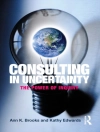This timely new edition describes how to use cognitive behaviour therapy successfully with clients in a brief, time-limited way. After reading this book therapists will be able to provide effective help to clients suffering from a wide range of disorders, including anxiety, depression, obsessive-compulsive disorder and post-traumatic stress, or those who are suicidal.
Following an explanation of brief therapy and the theory behind cognitive behaviour therapy, the authors outline strategies for helping clients overcome unhelpful beliefs and thought patterns through all stages of counselling. Using illustrative case material throughout, the updated book includes:
- extra practical material for the client and therapist to use during the counselling process
- a brand new chapter on brief CBT in groupwork
- expansion of discussion on counselling suicidal clients within a brief CBT framework.
Every trainee psychotherapist should own a copy of this book, and it is important reading for all new health professionals working in the NHS and private practice.
Daftar Isi
Introduction
The Cognitive Behaviour Framework
Assessment
Beginning Stage of Therapy
Middle Stage of Therapy
End Stage of Therapy
Additional Strategies and Techniques
Hyponosis as an Adjunct to Cognitive Behaviour Therapy
Brief Therapy – Groups
Treatment Protocols
Tentang Penulis
Peter Ruddell is a cognitive behavioural psychotherapist accredited by the British Association of Behavioural and Cognitive Psychotherapies (BABCP) and the Association for Rational Emotive Behaviour Therapy (AREBT). He has worked in both the voluntary and private sectors. He has contributed to a number of publications including the following books published by Sage: Client Assessment (1997), Introduction to Counselling and Psychotherapy (2000), The Beginner’s Guide to Counselling and Psychotherapy (2015), as well as Suicide – Strategies and Interventions for Reduction and Prevention (Routledge, 2008). He is a member of the European and International Advisory Board of the European Journal of Counselling Theory, Research and Practice. Peter is clinical director of the Centre for Stress Management, London.












